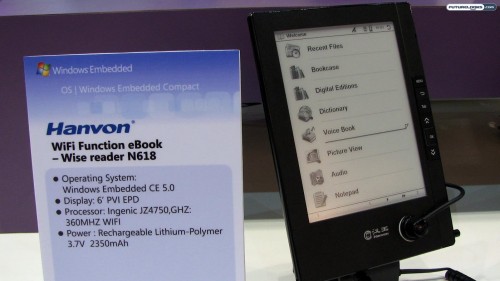Limits to the Cloud-Based Gaming

The Asus VP went on to discuss digital download platforms like Steam and browser-based portals like Playfish, as well as the growth of cloud-gaming solutions like OnLive. Digital delivery skips the middleman, giving the publisher more money while offering the consumer a lower price.
Hsieh does not view the streaming nature of “cloud” games as a threat to the Asus gaming hardware business. That’s because there are inherent limits to the cloud. Players have to worry about bandwidth, latency, and peak load.
For this reason, he believes that most hardcore gamers will still want to have their own PC. This way, they are able to enjoy optimal performance, an optimal experience (3D video, surround sound, and so on), and bragging rights.
Hanwang Pushes Ebooks in China

Do you think the Apple iPad is going to kill the relatively young e-book reader market? Hangwang Technology Chairman Yingjian Liu certainly doesn’t think so.
In fact, his company (which sells its products under the Hanvon brand name) sold 180,000 of its e-book readers in the first quarter of this year. They couldn’t keep up with demand, he said, and they probably could have sold more if the supply chain ramped up.

Hanwang operates largely inside of China, selling to Chinese consumers, but many of Liu’s points could be expanded to e-book readers from other companies too.
Regular published books can be very wasteful, in terms of paper, packaging, and ink, as well as all the warehousing costs involved with unsold copies. According to Liu, as much as 40% of published books are sitting in publisher warehouses.
Just as we moved from film to digital for our pictures and CDs to MP3s for our music, the same thing is happening to our books. As costs lower on the actual e-book readers themselves (Hanvon e-readers can be had for $100-$150), the adoption rate should increase.
BenQ Offers Cloud Bookshelf with Ebook Taiwan

James Lee, General Manager of Computing and Mobile Products Business Unit at BenQ, echoed many of the sentiments expressed by Hanwang’s Yingjian Liu. He reminded us of the importance of localization, a “soft touch” back, and ready access to digital delivery on the go.
At the same time, he recognizes that no matter how much memory you put in an e-book reader, you are inherently limited in your storage. That’s why BenQ launched Ebook Taiwan in January of this year. The online bookstore for e-books actually stores your purchases in the cloud. This way, you can access your “cloud bookshelf” from anywhere and from multiple devices.
Yes, we’re back in the cloud again. That’s not only where the e-book industry could be heading, but it could be indicative of more cloud computing to come. Don’t forget that Futurelooks is one of only a couple of sites LIVE Twittering as we see things at COMPUTEX. Make sure you follow us on Twitter to keep up to date on everything we see as we see it. Make sure you check out our YouTube Channel for exclusive videos as we post them. More pictures after the break.
Love or Hate Our Coverage? Leave a Comment or Hit The Forums!
